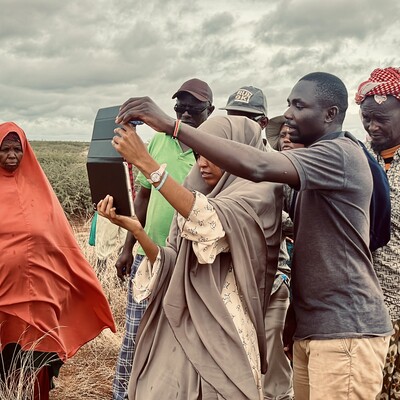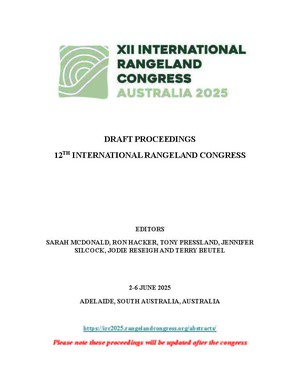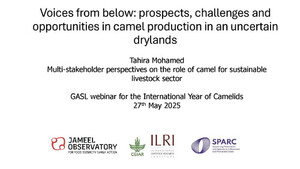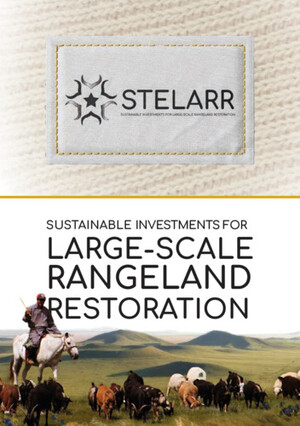
Impact assessment confirms Participatory Rangeland Management's positive impact on rangelands and pastoral communities
In November and December 2021, the ILRI-led Livestock CRP contracted African Research and Economic Development Consultants to conduct an independent impact assessment of the Participatory Rangeland Management (PRM) pilot in Kenya and Tanzania. PRM works through three stages and eight steps, building the capacity of local communities to better manage their land in the face of new challenges and improving their security of access to land and resources. Already scaled up across pastoral areas in Ethiopia, the EU-funded Piloting of PRM project in Kenya and Tanzania, coordinated by the International Land Coalition and implemented by the Resource Conflict Institute, Tanzania Natural Resource Forum, ILRI and VSF-Belgium, provided the opportunity to test the innovation in new contexts.
Based on 2,000 interviews and focus group discussions, the study outlined PRM’s impact on rangelands, good governance processes, security of rights to land and resources, livestock production and gender equity. It also identified key lessons and best practices for scaling up PRM in the future. ‘This independent impact assessment was an important evaluation point in the development of PRM as an innovation and its suitability for further scaling’, said Fiona Flintan, lead ILRI scientist supporting the development of PRM.
The assessment showed that improved rangeland condition was the first major impact observed during PRM implementation, reported by 96 per cent and 93 per cent of the participating communities in Kenya and Tanzania respectively. Within those participating communities, more than 90 per cent of community members also reported increased participation in rangeland management. These outcomes were achieved through the implementation of rangeland management plans and PRM training exercises for local communities.
Another major outcome was improved access to rangeland resources and a sense among local communities that the rangelands belonged to them, also reported by more than 90 per cent of communities. As a result, the PRM project areas have experienced a significant reduction in resource conflicts since the start of the project.
A central component of the PRM project was increasing the role of women in rangeland management. Around 95 per cent of women in the PRM pilot areas reported an increase in the number of women in leadership positions along with an overall improvement in women’s participation in rangeland governance. In Kiteto, Tanzania, women have set up forums that meet regularly to discuss matters that affect them concerning rangeland resources. In Baringo, Kenya, women can now own production units and run their own businesses, resulting in higher incomes for women.
Taken altogether, more than 80 per cent of the direct beneficiaries from the PRM pilot indicated that the project enhanced livelihoods, bolstered food and nutrition security, raised incomes and improved local communities’ capacity to cope with drought and other crises. Of particular note is that the annual income from livestock sales in Tanzania increased from US$650 in 2019 to US$1,097 at the time of the impact assessment, highlighting PRM’s role in improving livestock production and pastoral livelihoods.
The assessment also identified important lessons for scaling up PRM processes moving forward. Perhaps the most important lesson is that a group approach, which has been found to improve information sharing and enhance community participation, is vital to achieving PRM’s intended impacts. Group approaches can be streamlined through training and capacity-building exercises that strengthen community clusters and livestock associations.
At the same time, local communities must be allowed control over their own rangeland resources as this creates a sense of ownership and trust in the PRM process among community members. One way to achieve this is by building local capacity to implement Community Rangeland Investment Fund (CRIF) projects. These projects not only help communities take charge of their rangelands but also support the intensification of beneficial livelihood activities, such as beekeeping, livestock breed improvement and eco-tourism.
Finally, the assessment determined that collaboration with government, policymakers and other key stakeholders is crucial to scaling up good practices and addressing the remaining challenges facing local communities. Continued collaboration will also help ensure project sustainability because government agencies can take over the project once it ends.
Ultimately, the impact assessment underscores the tremendous opportunities to scale up the PRM approach in Kenya and Tanzania moving forward. The positive outcomes already achieved by the PRM pilot highlight the long-term benefits these future efforts could bring to local communities and rangeland health.
Baringo County, Kenya (photo credit: ILRI/Marco Buemi)


















